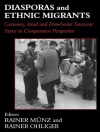This book explores contemporary urban experiences and how they are connected to practices of sharing and collaboration. There is a growing discussion on the cultural meaning and politics of urban commons, and Stavrides uses examples from Europe and Latin America to support the view that a world of mutual support and urban solidarity emerges today in, against and beyond existing societies of inequality. The concept of space commoning is discussed and considered in terms of its potential to promote emancipation. This is an exciting book, which explores the cultural meaning and politics of common spaces in conjunction with ideas connected with neighbourhood and community, justice and resistance, in order to trace elements of a different emancipating future.
Inhoudsopgave
Introduction and acknowledgements
1 Space as potential
2 Commoning architectures
3 Territorialities of emancipation
4 Reclaiming public space as commons: the squares movement and its legacy
Interview with Zeyno Perkunlu
5 Commoning neighborhoods: resisting urban renewal in Barcelona’s periphery
Interview with Stefano Portelli
6 Commoning neighborhoods: the mutual help practices of Brazilian homeless movements
Interview with Pedro Arantes
7 Commoning neighborhoods: building autonomy in Mexico City
8 Objects in common: objects for commoning
9 Emancipating commoning?
Index












